#i highly highly recommend it btw
Explore tagged Tumblr posts
Text
not to be a one-note person or one of those "man this reminds me of a book I read" people but so many times recently I have thought, "I need you to read the word for world is forest by ursula k le guin and then we can have this conversation again"
#2023 is an experience#text post#my post#i highly highly recommend it btw#yes i know i am one of those this reminds me of a book people but like#it is very good at displaying both the mindset and series of justifications of colonialism and imperialism#and the violence often necessary in the decolonial process (of course caused by the violence of the colonial project)#and the way a whole people is changed and shaped by both experiencing and participating in violence#this makes it sounds like it's a both-sides book it is emphatically not#it's very much a decolonial book yknow#but it's also about the violence of the process and how it fucks everyone up#idk#it's a good book#and as someone who thinks often about what the process of independence looked like in the 60s and what decolonisation and anti-imperialism#looks like today#and about the human cost always associated#and the human cost inherently associated with colonisation and imperialism (that sometimes doesn't get noticed bc it's less... obvious?...#... more acceptable? regarded as 'less human' bc of all the work that's been put into dehumanisation and desensitisation?)#it meant a lot to me#i've been talking lots about kids and to kids about conflict recently as well which makes me think#there was a post going round on here that i didn't reblog (maybe i should've)#from someone pointing out that you have to acknowledge that a lot of the western jewish diaspora is having a reaction of grief to the#7th oct attacks and how it feels personal etc#and they did talk about the politicisation of grief and how *that* grief is being used by western powers and legitimised over say#palestinian grief or grief over a second nakba etc etc#but like yeah i don't think we get anywhere if we don't acknowledge that#people ARE having emotional reactions#it makes sense right#we gotta. acknowledge that and deal with it and ALSO realise in that that some (people's) emotions are being given more weight than others#i guess what i'm saying is read the book
5 notes
·
View notes
Text


I love this book to death, so here's some things I noticed <3
#hyde being short is quite possibly my favourite thing ever#this isnt me jabbing at the takes that stray from the book#just btw XD#i think thats a big reason why i love it so much is that theres a WEALTH of inspiration that can be taken from the jekyll and hyde trope#theres so much out there i love#that being said#ive been buzzing about jekyll n Hyde recently because of this game that blindsided me with a jekyll n hyde trope#its always fun seeing it out in the wild#as seldom as that is LMAO#if anyones curious though its called vampire therapist and its a character named dr drayne#very cute and very fun game 💕💕#jekyll and hyde#the strange case of dr jekyll and mr hyde#dr jekyll#mr Hyde#also talking about blindsided by gothic lit blorbos#saw an animated Jekyll and hyde movie at the DOLLARSTORE for 5 smackaroos#easiest 5bucks i ever spent#literally the funniest shiy ive ever seen highly recommend watching it pals#its also on youtube for free and its in that so bad its good category for me
3K notes
·
View notes
Text








SEVERANCE #02.04: ‘Woe's Hollow’ + REDDIT TEXT POSTS [Episode 1] [Episode 2] [Episode 3]
#severance#apple tv#severanceedit#appletvedit#tvedit#cinematv#userstream#chewieblog#dailyflicks#filmtvcentral#usersameera#useranimusvox#bladesrunner#userhann#userclara#usernia#userlera#usernastya#*#don't want to be dramatic but severance is single handedly saving television right now#no one is doing it like them#i've been listening to the podcast with ben stiller and adam scott btw and the lore is sosososo interesting#i highly recommend listening to it!#what a time to be alive man. we truly are witnessing television history !!!!
654 notes
·
View notes
Text

Forlorn
#gravity falls#stanford pines#ford pines#portal ford#my art#almost almost gave up on this#but I really liked the background too much to toss#it’s sad boi hours#that photo still kills me#inspired by a piece from _earbean on insta#who makes stunning background art btw highly recommend
2K notes
·
View notes
Note
I'm doing it. Whatever organism this comes up as, I will make a character* of that species. Even if it's a plant. Even if it's a mushroom. Even if it's microscopic. Even if it's barely studied. Even if it's a species I've made before.
(if this comes up as human I might actually cry but I'll still do it)
*probably just a character design but still
String identified: ' g t. at ga t c a, a a caact* tat c. t' a at. t' a . t' ccc. t' a t. t' a c ' a .
( t c a a gt acta c t ' t t)
*a t a caact g t t
Closest match: Sus scrofa family with sequence similarity 76 member B (FAM76B), transcript variant X4, misc_RNA Common name: Wild boar

(image source)
#tumblr genetics#genetics#asks#requests#sent to me#tangleslime2#mammals#boars#wild boar#this is a baby boar btw. the adults have different fur patterns#but it was so cute i wanted to use it hehe#if you guys have never used inaturalist i highly recommend it#some people on there are fantastic nature photographers#especially this guy. you should check his inaturalist page he's got some really nice photos
2K notes
·
View notes
Text
⚠️Spoilers for Look Back but I was initially confused about what Fujino and Kyomoto's relationship had to do with pursuing a career as a mangaka. After thinking about it, I interpret it as a narrative device to represent what will come when choosing to pursue art (of any form, whether it's comics, painting, animation, music, etc.).
Think about it, what's Kyomoto's role in the story? She is what got Fujino to take art seriously in middle school, and what motivated her to continue after she initially gave up. However, she's also the only thing in the story that makes Fujino wish she quit art. First, halfway through 6th grade and then later after her death. She serves as Fujino's motivator and de-motivator.
I think the scene of Fujino wishing that she never told Kyomoto to come out (that pursuing art only led to suffering) represents artists' regrets. We literally look back and see an alternate universe where Fujino never pursued art and it has a happier ending. Anyone that pursues artistic dreams will end up regretting it at some point. It's not easy, any artist will tell you that. The story is saying yes, you probably will end up healthier and more stable by giving up your dreams. Because art is suffering.
But then Fujino enters Kyomoto's room after reading the comic from the alternate reality and all of a sudden we get a montage of the happy memories and accomplishments they had pursuing their dreams together. And we realize that, everything we saw of them in the alternate 'happier' reality pales in comparison to this:


The happiest both of them look in that alternate world is when they finally meet and promise to work together someday. They loved art. They loved each other. Giving up on your dreams means missing out on all of that, and nothing in the world can replace it. Because yes art is suffering, but art is also joy and love.
And so the end of the story where Fujino goes back to work isn't her moving on. She tapes the comic strip in front of her to remind her of Kyomoto, to remind her of why she got into comics in the first place. Basically, Kyomoto IS art to Fujino. A life with her means experiencing both suffering and joy, while the life without her means having none of that.
I might be wrong about this, like maybe Fujimoto just wanted to tell a mangaka story with doomed yuri (valid) HOWEVER i like my interpretation so im sticking with it.
#sorry sorry sorry i just have Thoughts#and none of my friends have watched this movie so I dont have anyone to talk with about it#anyway this movie made me cry and gave me emotional damage. 10/10 highly recommend#i wanted to tag their shipname but i cant bc its literally just fujimoto's name why did he name them after himself im laughing#using a doomed love to represent artists' suffering and joy is genius btw#not everyone knows what its like to pursue art but everyone has that one person they loved (romantically or platonically) and lost#my post#Look Back#look back movie#look back spoilers#look back analysis#ayumu fujino#kyomoto
585 notes
·
View notes
Text
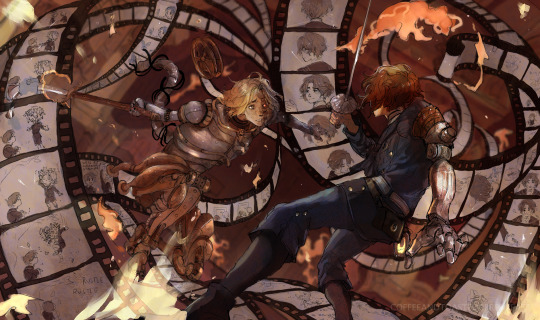
It’s all going up into flames…bright, white flames…
#lies of p#lies of p spoilers#lies of p romeo#p lies of p#Romeo’s boss theme Shattered Memories inspired me to make this#also I’ve been looking at Posuka Demizu’s work a lot recently and this too inspired me to make this#she’s one of my biggest art style inspirations and I highly recommend checking out her work!! (she worked on the promised neverland manga)#btw#Romeo’s boss fight is probably my favorite so far but man does he make me sad#my art#art style study#i originally wanted to draw shattered glass with the memories inside it#but I felt like the film tape was better for drawing the sequence of events imo
843 notes
·
View notes
Note
okay so:
the year is 2021. the month is june. the new season of hermitcraft, season 8, has just started, and everything is great! the hermits are all messing around, having fun, building insane things within the first week of the server being active, and generally having a good time. everyone's collected themselves into little factions, pranking each other, and it's all the fun, lighthearted, mostly-vanilla content hermitcraft is known for.
and then the split between minecraft versions 1.18 and 1.19 is announced. the delay of new terrain, and especially of new mobs like the warden, considerably disrupt several of the hermits' plans. but it's fine, they'll figure something out, they're professionals, and it mostly goes unnoticed.
about two weeks later, on november 9th, grian turns to mumbo jumbo in one of his episodes, and asks the famous question that would seal hermitcraft season 8's fate:
"mumbo, is the moon... big?"
suddenly, the fans panic. they search back through videos and streams, and realize that the moon had been abnormally large and stuck in a full-moon phase since october 30th. the Moon Big event has begun.
this is where the roleplay really starts. once the moon's size has been brought up, the hermits start a weird combination of scrambling to figure out why the moon's growing, and how to stop it- but also of ignoring it, hoping it won't be a problem, hoping someone else will deal with it. the moon keeps getting bigger, more hermits start realizing it's going on, and a creeping sense of dread starts to grow. but it's fine. it's fine, right? they do little plotlines like this all the time. they'll figure something out, the moon will go back to normal, and we'll laugh about it when this is all over. it's fine.
and then, blocks start flying away. just floating up out of the ground, and falling right back down! like for a moment, a square meter chunk of dirt has decided it's a ballerina and leaped out of the ground! but it's fine, right? the blocks are coming back. no lasting harm is done. they're going to fix it all... right?
the moon gets bigger. it's growing every day- local hermit weirdguy joe hills measures it every stream. the blocks start flying higher. gravity starts getting... weird, with players getting the slow falling effect at random, and being lifted off of the earth themselves. the players form cults and rituals and whatnot to try and appease the moon, convince it to leave them alone, making plans to escape. nothing works. things keep getting worse, and the moon keeps getting bigger. but it'll be fine. these storylines never leave lasting harm, or at least they never have before. they'll be fine.
and then the blocks stop coming back, just floating into the sky forever. the players have the slow falling effect more than they don't now. the moon is now so big it's visible even during the day, and fills the entire sky at night. they start planning their escapes in earnest, and say their goodbyes. some hermits jump into a void hole in the overworld (it was the centerpiece of their village). some flee to the End, some to the nether, some just fly with elytras and hope they can get far enough away in time. one brave hermit, tango, flies himself to the moon in a futile attempt to blow the whole thing up before it can crash.
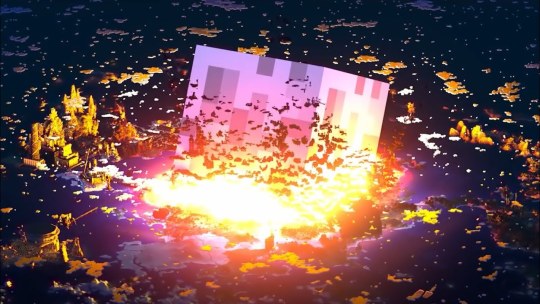
but in the end, the moon crashes into the server, and everything they'd built was destroyed. and the whole time, there'd been nothing any of them could've done. season eight was over, a full six months before anyone had expected it to end, and season nine wouldn't start until about three months later. and im still not okay about it.
(here's a cool animatic of the moon's crash! honestly i dont think you need too much hermitcraft knowledge to get the gist)
(also the moon crash happened on the day before my birthday lmao.)
….
holy shit
#ok ok let me see if i have the timeline correctly:#1) s8 begins in June and so does the new update announcement#2) months go by with no issue (that they’re aware of)#3) it’s in November when they realize the moon has been growing#4) does the moon crash in January???#but gawddam#that is one apocalypse story if I’ve heard of one#also fitting bc i think it was 2021 where we were getting a LOT of asteroid/moon fall movies#idk what was in the air (possibly the pandemic that led to unforced isolation & ppl coped with apocalypse stories)#and somehow that bled through to a Minecraft server???? somehow?????#wild#this also reminds me of an apocalypse movie i watched with a friend called ‘3 Días’#very good movie btw#highly recommend (it is a Spanish only film which i don’t think will be an issue bc subtitles)#anyway#asks#smp 101 with gumy#hermitcraft edition!
758 notes
·
View notes
Text
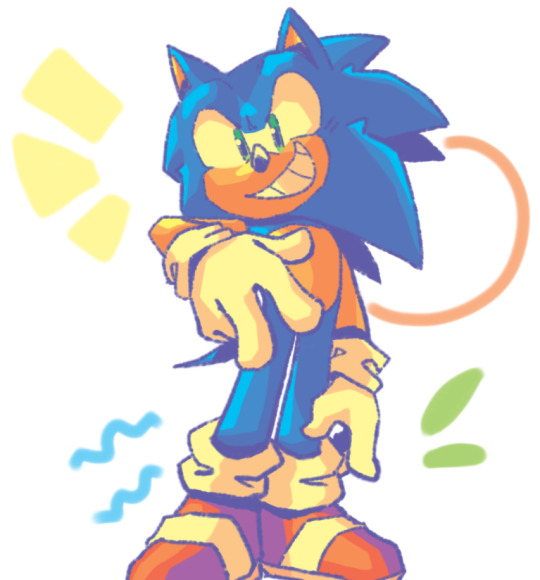
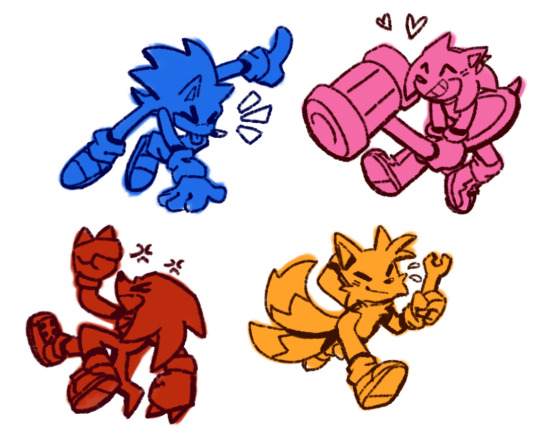
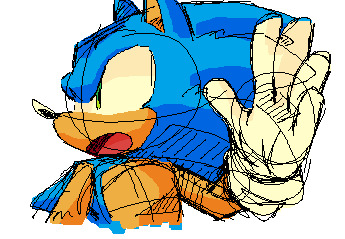
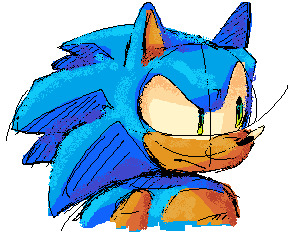
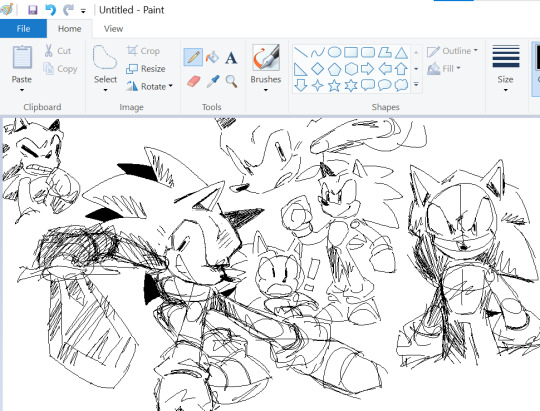
putting up my best art block defense *draws a guy* *draws a guy* *draws
#there are some not sonics here but i think theres a majority#in the second one i drew the silhouette in color then put lines over it btw. highly recommend it was really fun#also the first ones a redraw of an old official art pose#sth#doodles#sonic the hedgehog
499 notes
·
View notes
Text

terribly designed game how was i supposed to play through the tears smh
#until then#until then game#nicole lacsamana#mark borja#chiimo art shenanigans#marcole#HHGBRHRGRHBRBRHGRHR I HATE THEM SO MUCH#polychroma giveth#and polychroma taKETH AWAY IM STILL ANGRY#10/10 game btw highly recommend <3
345 notes
·
View notes
Text
my fav little diana pictures/panels from absolute wonder woman #1 because she’s everything 🫶







#VERY good comic btw if you can get your hands on it i highly recommend#not art#dc#diana of themyscira#circe#wonder woman#dc comics#absolute wonder woman#wednesday spoilers#absolute wonder woman spoilers#i really love this twist on circe and diana’s relationship#circe being randomly assigned a baby to raise in hell isnt smth i knew i needed until now
191 notes
·
View notes
Note
Hi Eret! I was at Tommy's show tonight and I just wanted to say that I'm so, so deeply sorry if us in the vip section pointing you guys out caused you or any of the other ccs there any trouble. It was absolutely amazing being able to see you though, even from the first floor. I hope you still enjoyed the show!
No worries! Let me explain how it was from our perspective
I was invited to TommyInnit's LA show last night with some other creator friends (e.g. Slimecicle, Ted Nivison, RubberRoss, and more). Security tried to make sure that we wouldn't get swarmed, so they brought us in at the back of the theatre and took us away for the intermission.
We were brought back a bit early for the start of the second act. All the lights were still on, and when one person saw us and shouted our names, everyone else started turning around!
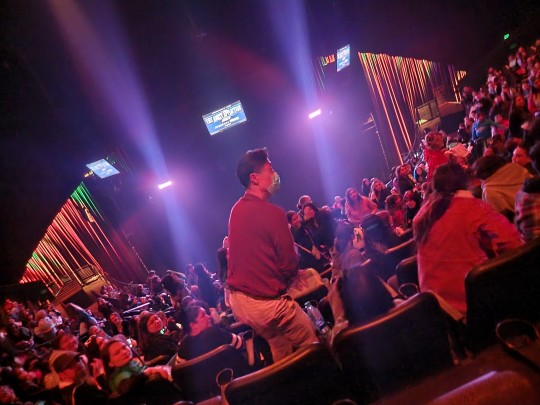
It was so sweet to see how excited everyone was! But I did definitely appreciate that the security was on top of it to prevent it from getting too rowdy! I hope you enjoyed the show!
#askeret#tommyinnit#the only other time this has happened to me was at a Lovejoy show in 2022!#the show was great btw#if you are a Tommy enjoyer I would highly recommend
569 notes
·
View notes
Text




thought about a vbros moon 2009 au a bit too hard context for those curious under the cut
1) every single person who works alone on this moon base is given a 3 year contract, and rusty's 2 weeks away from finishing his. What he doesn't know is that due to alteration in his clone dna, all clones start falling apart if they end up living past their due date. 2) rusty is in disbelief at the concept that he is a clone and lashes out at the monarch for merely suggesting that all facts point towards the two of them being clones of the original.
3) rusty and the monarch get into a physical fight as per usual. however at this point rusty's body has begun deteriorating due to his fucked up dna and is 10x more fragile to almost everything than the average human.
4) the only reason rusty is truly still alive is because he was pulled out of a crashed mineral harvester after being presumed dead by the base's personal computer by the newly awakened monarch. however, a rescue unit has been sent and will expect a body to be in that harvester. he and the monarch realize that now that they both know way too much about the industry they work for they are likely going to be killed for it once the rescue unit arrives, and consider waking up another clone, killing him, and placing him in the harvester. however both know they could never go through with this.
#whewwww this one took a good couple of days#highly recommend watching moon 2009 btw. extremely good movie. funny computer in there too#i might draw more things based on this in the future but i need a breather rn#rusty venture#the monarch#malcolm fitzcarraldo#the venture bros#venture bros#vbros
147 notes
·
View notes
Text
the sequel to phan made out of phan: here is dan made out of dan and phil made out of phil


#once again i did type this whole thing out by hand#it's actually a really fun art form#highly recommend to those who enjoy pixel art#btw phil looks squished bc his name is longer & therefore each “pixel” is actually more like a rectangle#dnp#phan#dan and phil#amazingphil#daniel howell#danandphilgames#me post#my art#phanart#dnp fanart
128 notes
·
View notes
Text

Someone asked for Nikolai in a jockstrap, and I had to provide 🚁🐻
Lineart bellow ⬇️

#cod#cod nikolai#nikolai cod#eheheheheh tumblr don't kill me this is a fully dressed man#kind of#yeah so#Did I go a little crazy on the body hair? Maybe. I made a timelapse btw which I will post another time#I consulted Jack on that package size btw so say thank you Jack for the big bulge everyone#Highly recommend looking at the lineart to appreciate the body hair#took me hours guys HOURS JUST FOR THE BODY HAIR#sick in the brain#brrrrrrrrrr#anywayyyyy#teehee#my art
119 notes
·
View notes
Note
Can U blast this https://urbanshade.org/wiki/Documents/Sebastian_Solace pls
String identified: caTatcaaaaaataactGTtttatcagcatcttcagtctaaaattattatcttataCAagtataaaCCTaatccatttatacattcctaccatccttttattagtCAcatacatagataatatttgtccataAtggtctatattccagagtattGaaacggcaaccaactaaatatctatccagatctagacggttaCACCTcattagttacgtatacttatatctaacattatctgaaggtgatgctaaaattagaattaagaatAtgctactttatcgattgaagtaaatagtctaatctatctccaacaaaacttaaacacaaaacttatattgaggAtaaaaaaagattaatatagaaaattttataaccagatattatattaacttctTctctatttctatgcacatatGagattactTtagttatattattcactttatcattattaaaccaacttcaattcacataAtttgtattgaagtattatacattactatattaaaccatatactaagtctatttattacttattcaagacacaAtttaggttatagaatttttatagaaacagtgtttgctaacctcatagaaaatcctaccaatatactaaattctttaatctaaatattagtttggg
Closest match: Balaenoptera musculus genome assembly, ██████ ████████ genome assembly, Microcephalophis gracilis genome assembly, Carcharodon carcharias genome assembly, Bufoceratias wedli mutated genome assembly, Diretmus argenteus genome assembly, Gonodactylus smithii genome assembly, Homo sapiens genome assembly Common name: THAT FUCKING FISH THAT I HATE
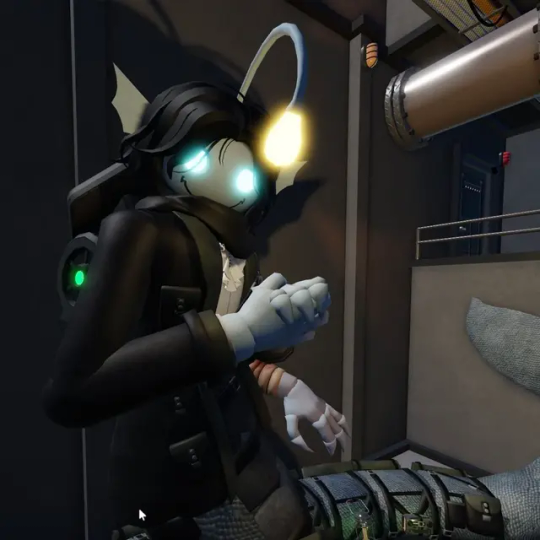
(If this image source is shown to unauthorized personnel, you'll be BLASTed with my wizard beams)
#asks#anon#pressure#pressure game#sebastian solace#all of the species listed here are as accurate as they can be btw.#my neurodivergence knows no bounds#shoutout to this game for actually getting me interested in anglerfish biology. and mantis shrimp.#and if you dont know what a silver spinyfin is i HIGHLY recommend doing an image search#first time i saw it i laughed so hard my stomach hurt#big props to the pressure team for that too.#anyway. if anyone needs me i'll be writing a dissertation on whether sebastian is warm blooded or not#and if the pressure team needs an insane biologist to ramble about their scifi horror to. they know where to find me
544 notes
·
View notes